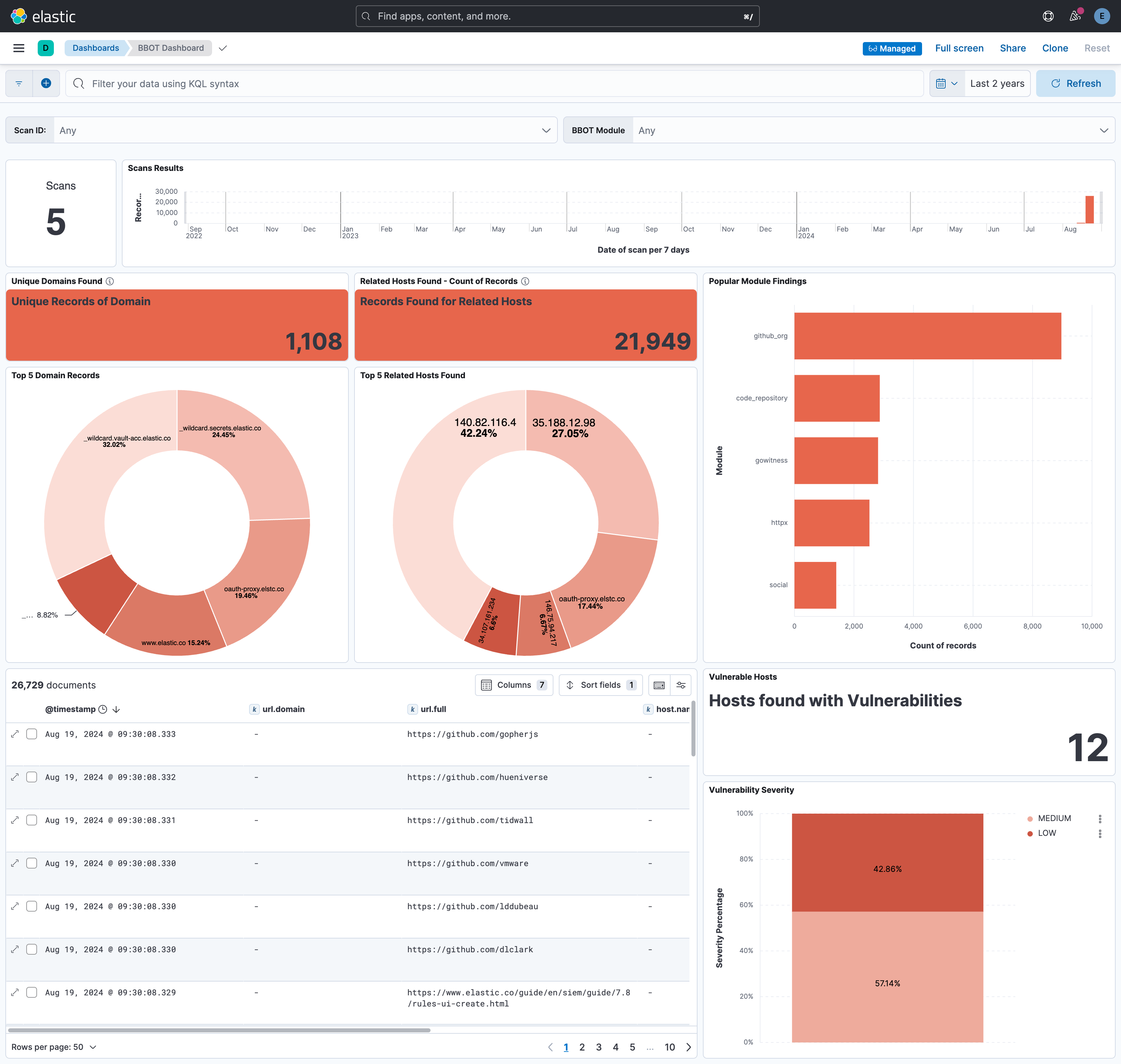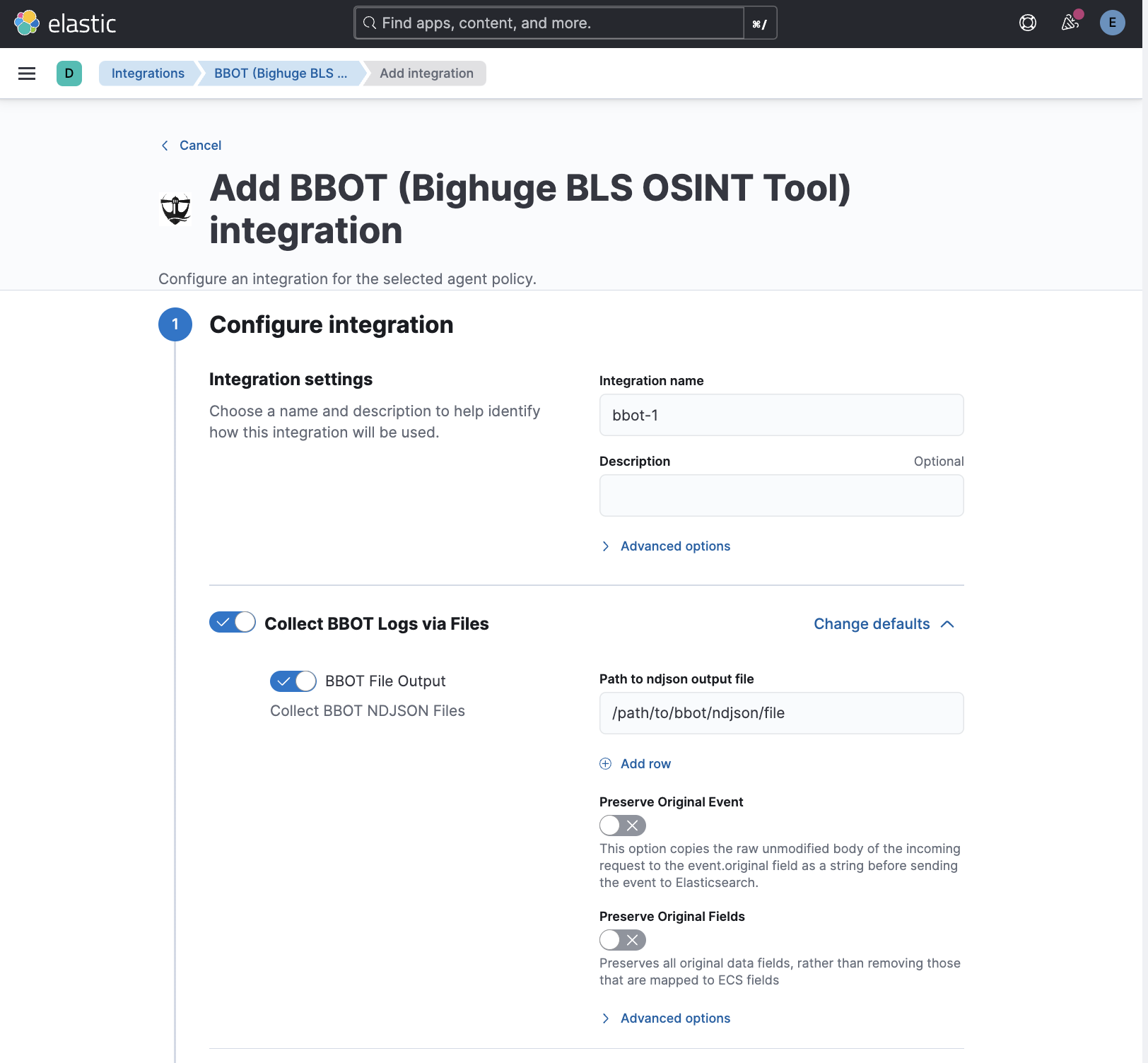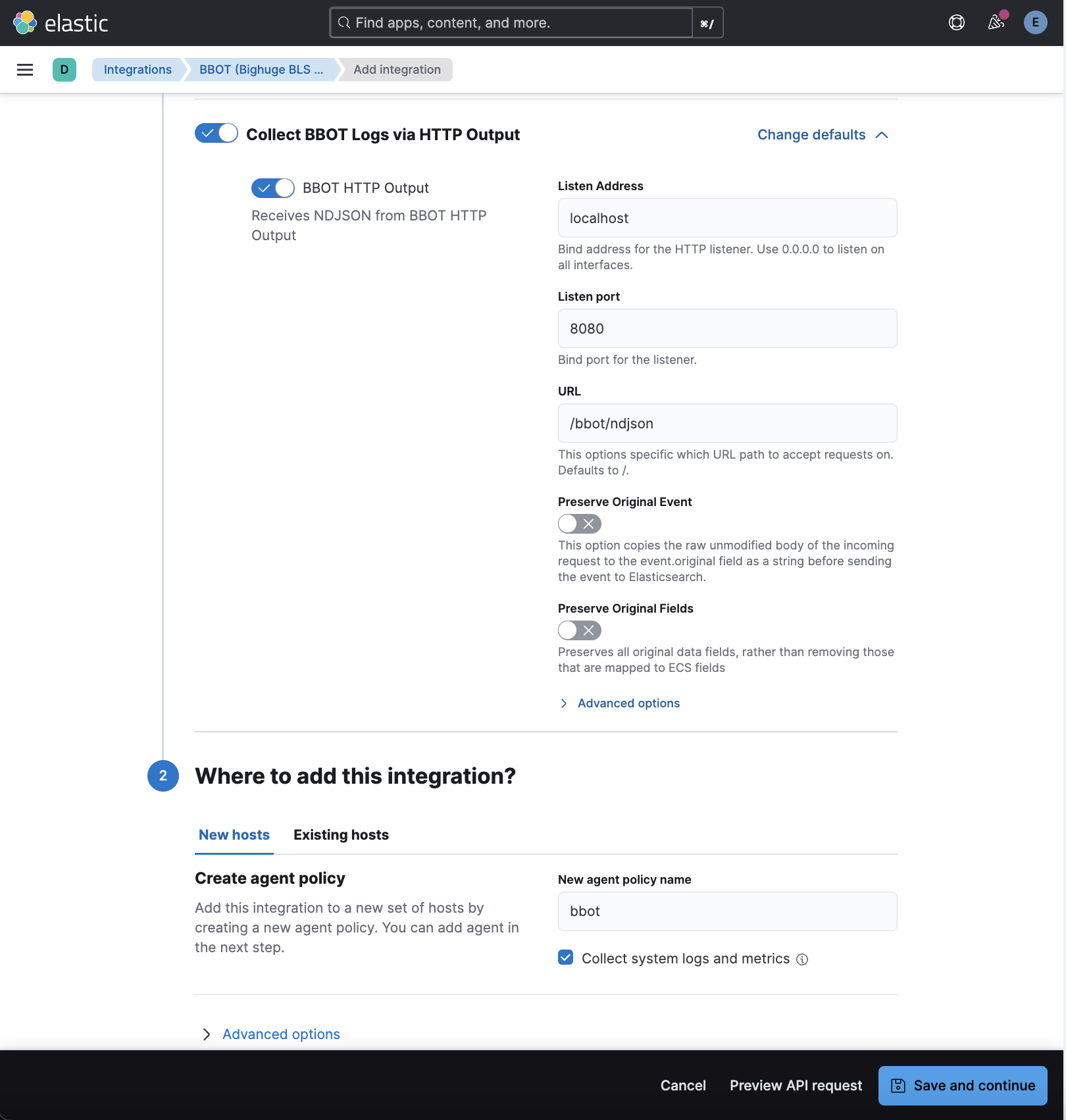BBOT integration
| Version | 1.4.0 (View all) |
| Subscription level What's this? |
Basic |
| Developed by What's this? |
Community |
| Ingestion method(s) | File, Webhook |
| Minimum Kibana version(s) | 9.0.0 8.13.0 |
The Bighuge BLS OSINT Tool (BBOT) integration is intended for BBOT installations, an Attack Surface Management (ASM) Open Source Inteligence (OSINT) Tool.
Once the BBOT scan is complete, the integration will ingest the results into Elastic.
This integration requires the external use of BBOT. You will have to download and run the tool apart from this integration. Once your scan is complete, this integration can ingest the results into Elastic using the BBOT json output module or the http output module aka. HTTP POST/webhooks.
As of version 1.1.2 of this integration, both BBOT 1.x and 2.x are supported. However all examples provided by the module documentation now assume use of BBOT 2.x.
Note that BBOT 1.x formats are currently being supported on a best-effort basis only and support will eventually be removed.
Please upgrade to BBOT 2.x as soon as possible to ensure continuity of features and functionality.
To support the conflicting BBOT NDJSON event formats, the following occurs during ingest of BBOT 2.x SCAN events:
- The
bbot.data.scanfield, if received as an object, is renamed tobbot.data.scan_config bbot.data.scanis set using the ID and name of the scan to replicate the field type and content generated by BBOT1.x
This tool is used to enhance your external knowledge of your environment. This is done through the integration of many tools into BBOT providing a overview of your attack surface. Here is how it works.
Important Note
You have to provide the following parameter in your BBOT scan to get your output.json formatted correctly.
-c modules.json.siem_friendly=true
Alternatively, if you are using the HTTP output modules:
-c modules.http.siem_friendly=true
It's recommended to at least filter out HTTP_RESPONSE and RAW_TEXT events from reaching the SIEM, as they may contain excessive field data that could be difficult to process.
Make sure the configuration option is default, or is similar to the following:
omit_event_types:
- HTTP_RESPONSE
- RAW_TEXT
Example BBOT Scan
If you use the integration to collect log files from disk, you can simply use the JSON output module.
bbot -t example.com -p subdomain-enum -c modules.json.siem_friendly=true -om json
If you use the integration to receive events via HTTP endpoint listener, you can use the HTTP output module.
bbot -t example.com -p subdomain-enum --config modules.http.url=http://your.elastic.agent:8080/bbot/asm_intel modules.http.username=bbot modules.http.password=P@55w0rd modules.http.siem_friendly=true -om http
You will have to configure the path for the output file within the integration settings.
The output modules can also be configured as part of the bbot.yml or preset files.
config:
modules:
http:
url: 'https://your.elastic.agent:8443'
method: POST
username: 'bbot'
password: 'P@55w0rd'
siem_friendly: true
json:
siem_friendly: true
Example BBOT Path
/home/<user>/.bbot/scans/*/output.json
BBOT Scanning Documentation.
This integration collects the following logs:
- asm_intel Made up of the findings found in the BBOT Scans.
Elastic Agent must be installed. For more details, check the Elastic Agent installation instructions.
- In Kibana navigate to Management > Integrations.
- In the search bar, type BBOT.
- Select the BBOT integration and add it.
- Add all the required configuration parameters, including the path to the
ndjsonfile. - Save the integration.
Example
{
"@timestamp": "2024-02-29T01:41:47.779Z",
"agent": {
"ephemeral_id": "0c16a7c4-c1a9-424a-b859-29af68197f5c",
"id": "91b85fe6-d0c4-4bfc-863d-e10a462e0968",
"name": "elastic-agent-38224",
"type": "filebeat",
"version": "8.15.3"
},
"bbot": {
"data": {
"dns_name": "example.com"
},
"id": "DNS_NAME:f57ba0828becd7bf94faa616db081ed06f31bd3d",
"module": "TARGET",
"module_sequence": "TARGET",
"resolved_hosts": [
"1.128.0.0"
],
"scan": "SCAN:725368977d3a680e579707504e59428a7e3acc9d",
"scope_distance": 0,
"source": "SCAN:725368977d3a680e579707504e59428a7e3acc9d",
"tags": [
"resolved",
"a-record",
"target",
"in-scope",
"subdomain"
],
"timestamp": "1.709170907779394E9",
"type": "DNS_NAME"
},
"data_stream": {
"dataset": "bbot.asm_intel",
"namespace": "28270",
"type": "logs"
},
"ecs": {
"version": "8.11.0"
},
"elastic_agent": {
"id": "91b85fe6-d0c4-4bfc-863d-e10a462e0968",
"snapshot": false,
"version": "8.15.3"
},
"event": {
"agent_id_status": "verified",
"category": [
"network"
],
"dataset": "bbot.asm_intel",
"ingested": "2024-11-14T08:17:02Z",
"kind": "asset",
"original": "{\"data\":{\"DNS_NAME\":\"example.com\"},\"id\":\"DNS_NAME:f57ba0828becd7bf94faa616db081ed06f31bd3d\",\"module\":\"TARGET\",\"module_sequence\":\"TARGET\",\"resolved_hosts\":[\"1.128.0.0\"],\"scan\":\"SCAN:725368977d3a680e579707504e59428a7e3acc9d\",\"scope_distance\":0,\"source\":\"SCAN:725368977d3a680e579707504e59428a7e3acc9d\",\"tags\":[\"resolved\",\"a-record\",\"target\",\"in-scope\",\"subdomain\"],\"timestamp\":1709170907.779394,\"type\":\"DNS_NAME\"}",
"type": [
"info"
]
},
"host": {
"name": "example.com"
},
"input": {
"type": "http_endpoint"
},
"related": {
"hosts": [
"1.128.0.0"
]
},
"tags": [
"preserve_original_event",
"preserve_duplicate_custom_fields",
"forwarded",
"bbot"
],
"url": {
"domain": [
"example.com"
]
}
}
Exported fields
| Field | Description | Type |
|---|---|---|
| @timestamp | Event timestamp. | date |
| bbot.data.asn.asn | keyword | |
| bbot.data.asn.country | keyword | |
| bbot.data.asn.description | keyword | |
| bbot.data.asn.name | keyword | |
| bbot.data.asn.subnet | keyword | |
| bbot.data.azure_tenant.domains | keyword | |
| bbot.data.azure_tenant.tenant-id | keyword | |
| bbot.data.azure_tenant.tenant-names | keyword | |
| bbot.data.code_repository.url | keyword | |
| bbot.data.dns_name | keyword | |
| bbot.data.dns_name_unresolved | keyword | |
| bbot.data.email_address | keyword | |
| bbot.data.filesystem.description | text | |
| bbot.data.filesystem.path | keyword | |
| bbot.data.finding.description | text | |
| bbot.data.finding.host | keyword | |
| bbot.data.finding.url | keyword | |
| bbot.data.http_response.a | keyword | |
| bbot.data.http_response.body | text | |
| bbot.data.http_response.cname | keyword | |
| bbot.data.http_response.content_length | unsigned_long | |
| bbot.data.http_response.content_type | keyword | |
| bbot.data.http_response.csp.domains | keyword | |
| bbot.data.http_response.failed | boolean | |
| bbot.data.http_response.hash.* | keyword | |
| bbot.data.http_response.header-dict.* | keyword | |
| bbot.data.http_response.header-dict.location | text | |
| bbot.data.http_response.header.* | keyword | |
| bbot.data.http_response.host | keyword | |
| bbot.data.http_response.input | keyword | |
| bbot.data.http_response.lines | unsigned_long | |
| bbot.data.http_response.location | keyword | |
| bbot.data.http_response.method | keyword | |
| bbot.data.http_response.path | keyword | |
| bbot.data.http_response.port | keyword | |
| bbot.data.http_response.raw_header | text | |
| bbot.data.http_response.request | keyword | |
| bbot.data.http_response.scheme | keyword | |
| bbot.data.http_response.status_code | unsigned_long | |
| bbot.data.http_response.time | keyword | |
| bbot.data.http_response.timestamp | keyword | |
| bbot.data.http_response.title | keyword | |
| bbot.data.http_response.url | keyword | |
| bbot.data.http_response.webserver | keyword | |
| bbot.data.http_response.words | unsigned_long | |
| bbot.data.ip_address | keyword | |
| bbot.data.open_tcp_port | keyword | |
| bbot.data.org_stub | keyword | |
| bbot.data.protocol.host | keyword | |
| bbot.data.protocol.port | unsigned_long | |
| bbot.data.protocol.protocol | keyword | |
| bbot.data.raw_dns_record.answer | keyword | |
| bbot.data.raw_dns_record.host | keyword | |
| bbot.data.raw_dns_record.type | keyword | |
| bbot.data.scan | keyword | |
| bbot.data.scan_config.duration | keyword | |
| bbot.data.scan_config.duration_seconds | float | |
| bbot.data.scan_config.finished_at | date | |
| bbot.data.scan_config.id | keyword | |
| bbot.data.scan_config.name | keyword | |
| bbot.data.scan_config.preset.config.aggregate | boolean | |
| bbot.data.scan_config.preset.config.cloudcheck | boolean | |
| bbot.data.scan_config.preset.config.deps.ffuf.version | keyword | |
| bbot.data.scan_config.preset.config.deps_behavior | keyword | |
| bbot.data.scan_config.preset.config.dns.abort_threshold | integer | |
| bbot.data.scan_config.preset.config.dns.brute_threads | integer | |
| bbot.data.scan_config.preset.config.dns.debug | boolean | |
| bbot.data.scan_config.preset.config.dns.disable | boolean | |
| bbot.data.scan_config.preset.config.dns.filter_ptrs | boolean | |
| bbot.data.scan_config.preset.config.dns.minimal | boolean | |
| bbot.data.scan_config.preset.config.dns.omit_queries | keyword | |
| bbot.data.scan_config.preset.config.dns.retries | integer | |
| bbot.data.scan_config.preset.config.dns.runaway_limit | integer | |
| bbot.data.scan_config.preset.config.dns.search_distance | integer | |
| bbot.data.scan_config.preset.config.dns.threads | integer | |
| bbot.data.scan_config.preset.config.dns.timeout | integer | |
| bbot.data.scan_config.preset.config.dns.wildcard_disable | boolean | |
| bbot.data.scan_config.preset.config.dns.wildcard_tests | integer | |
| bbot.data.scan_config.preset.config.dnsresolve | boolean | |
| bbot.data.scan_config.preset.config.excavate | boolean | |
| bbot.data.scan_config.preset.config.file_blobs | boolean | |
| bbot.data.scan_config.preset.config.folder_blobs | boolean | |
| bbot.data.scan_config.preset.config.home | keyword | |
| bbot.data.scan_config.preset.config.interactsh_disable | boolean | |
| bbot.data.scan_config.preset.config.keep_scans | integer | |
| bbot.data.scan_config.preset.config.modules.anubisdb.limit | integer | |
| bbot.data.scan_config.preset.config.modules.asset_inventory.recheck | boolean | |
| bbot.data.scan_config.preset.config.modules.asset_inventory.summary_netmask | integer | |
| bbot.data.scan_config.preset.config.modules.asset_inventory.use_previous | boolean | |
| bbot.data.scan_config.preset.config.modules.baddns.enable_references | boolean | |
| bbot.data.scan_config.preset.config.modules.baddns.only_high_confidence | boolean | |
| bbot.data.scan_config.preset.config.modules.baddns_zone.only_high_confidence | boolean | |
| bbot.data.scan_config.preset.config.modules.bevigil.urls | boolean | |
| bbot.data.scan_config.preset.config.modules.binaryedge.max_records | integer | |
| bbot.data.scan_config.preset.config.modules.bucket_amazon.permutations | boolean | |
| bbot.data.scan_config.preset.config.modules.bucket_azure.permutations | boolean | |
| bbot.data.scan_config.preset.config.modules.bucket_digitalocean.permutations | boolean | |
| bbot.data.scan_config.preset.config.modules.bucket_file_enum.file_limit | integer | |
| bbot.data.scan_config.preset.config.modules.bucket_firebase.permutations | boolean | |
| bbot.data.scan_config.preset.config.modules.bucket_google.permutations | boolean | |
| bbot.data.scan_config.preset.config.modules.builtwith.redirects | boolean | |
| bbot.data.scan_config.preset.config.modules.censys.max_pages | integer | |
| bbot.data.scan_config.preset.config.modules.discord.event_types | keyword | |
| bbot.data.scan_config.preset.config.modules.discord.min_severity | keyword | |
| bbot.data.scan_config.preset.config.modules.dnsbrute.max_depth | integer | |
| bbot.data.scan_config.preset.config.modules.dnsbrute.wordlist | keyword | |
| bbot.data.scan_config.preset.config.modules.dnsbrute_mutations.max_mutations | integer | |
| bbot.data.scan_config.preset.config.modules.dnscaa.dns_names | boolean | |
| bbot.data.scan_config.preset.config.modules.dnscaa.emails | boolean | |
| bbot.data.scan_config.preset.config.modules.dnscaa.in_scope_only | boolean | |
| bbot.data.scan_config.preset.config.modules.dnscaa.urls | boolean | |
| bbot.data.scan_config.preset.config.modules.dnscommonsrv.max_depth | integer | |
| bbot.data.scan_config.preset.config.modules.docker_pull.all_tags | boolean | |
| bbot.data.scan_config.preset.config.modules.excavate.retain_querystring | boolean | |
| bbot.data.scan_config.preset.config.modules.excavate.yara_max_match_data | integer | |
| bbot.data.scan_config.preset.config.modules.ffuf.lines | integer | |
| bbot.data.scan_config.preset.config.modules.ffuf.max_depth | integer | |
| bbot.data.scan_config.preset.config.modules.ffuf.wordlist | keyword | |
| bbot.data.scan_config.preset.config.modules.ffuf_shortnames.find_common_prefixes | boolean | |
| bbot.data.scan_config.preset.config.modules.ffuf_shortnames.find_delimiters | boolean | |
| bbot.data.scan_config.preset.config.modules.ffuf_shortnames.ignore_redirects | boolean | |
| bbot.data.scan_config.preset.config.modules.ffuf_shortnames.lines | integer | |
| bbot.data.scan_config.preset.config.modules.ffuf_shortnames.max_depth | integer | |
| bbot.data.scan_config.preset.config.modules.ffuf_shortnames.version | keyword | |
| bbot.data.scan_config.preset.config.modules.filedownload.base_64_encoded_file | keyword | |
| bbot.data.scan_config.preset.config.modules.filedownload.extensions | keyword | |
| bbot.data.scan_config.preset.config.modules.filedownload.max_filesize | keyword | |
| bbot.data.scan_config.preset.config.modules.fingerprintx.skip_common_web | boolean | |
| bbot.data.scan_config.preset.config.modules.fingerprintx.version | keyword | |
| bbot.data.scan_config.preset.config.modules.github_codesearch.limit | integer | |
| bbot.data.scan_config.preset.config.modules.github_org.include_member_repos | boolean | |
| bbot.data.scan_config.preset.config.modules.github_org.include_members | boolean | |
| bbot.data.scan_config.preset.config.modules.github_workflows.num_logs | integer | |
| bbot.data.scan_config.preset.config.modules.gowitness.idle_timeout | integer | |
| bbot.data.scan_config.preset.config.modules.gowitness.resolution_x | integer | |
| bbot.data.scan_config.preset.config.modules.gowitness.resolution_y | integer | |
| bbot.data.scan_config.preset.config.modules.gowitness.social | boolean | |
| bbot.data.scan_config.preset.config.modules.gowitness.threads | integer | |
| bbot.data.scan_config.preset.config.modules.gowitness.timeout | integer | |
| bbot.data.scan_config.preset.config.modules.gowitness.version | keyword | |
| bbot.data.scan_config.preset.config.modules.http.method | keyword | |
| bbot.data.scan_config.preset.config.modules.http.siem_friendly | boolean | |
| bbot.data.scan_config.preset.config.modules.http.timeout | integer | |
| bbot.data.scan_config.preset.config.modules.http.url | keyword | |
| bbot.data.scan_config.preset.config.modules.httpx.in_scope_only | boolean | |
| bbot.data.scan_config.preset.config.modules.httpx.max_response_size | long | |
| bbot.data.scan_config.preset.config.modules.httpx.probe_all_ips | boolean | |
| bbot.data.scan_config.preset.config.modules.httpx.store_responses | boolean | |
| bbot.data.scan_config.preset.config.modules.httpx.threads | integer | |
| bbot.data.scan_config.preset.config.modules.httpx.version | keyword | |
| bbot.data.scan_config.preset.config.modules.iis_shortnames.detect_only | boolean | |
| bbot.data.scan_config.preset.config.modules.iis_shortnames.max_node_count | integer | |
| bbot.data.scan_config.preset.config.modules.internetdb.show_open_ports | boolean | |
| bbot.data.scan_config.preset.config.modules.ipneighbor.num_bits | integer | |
| bbot.data.scan_config.preset.config.modules.json.siem_friendly | boolean | |
| bbot.data.scan_config.preset.config.modules.neo4j.uri | keyword | |
| bbot.data.scan_config.preset.config.modules.ntlm.try_all | boolean | |
| bbot.data.scan_config.preset.config.modules.nuclei.batch_size | integer | |
| bbot.data.scan_config.preset.config.modules.nuclei.budget | integer | |
| bbot.data.scan_config.preset.config.modules.nuclei.concurrency | integer | |
| bbot.data.scan_config.preset.config.modules.nuclei.directory_only | boolean | |
| bbot.data.scan_config.preset.config.modules.nuclei.mode | keyword | |
| bbot.data.scan_config.preset.config.modules.nuclei.ratelimit | integer | |
| bbot.data.scan_config.preset.config.modules.nuclei.retries | integer | |
| bbot.data.scan_config.preset.config.modules.nuclei.silent | boolean | |
| bbot.data.scan_config.preset.config.modules.nuclei.version | keyword | |
| bbot.data.scan_config.preset.config.modules.oauth.try_all | boolean | |
| bbot.data.scan_config.preset.config.modules.paramminer_cookies.recycle_words | boolean | |
| bbot.data.scan_config.preset.config.modules.paramminer_cookies.skip_boring_words | boolean | |
| bbot.data.scan_config.preset.config.modules.paramminer_getparams.recycle_words | boolean | |
| bbot.data.scan_config.preset.config.modules.paramminer_getparams.skip_boring_words | boolean | |
| bbot.data.scan_config.preset.config.modules.paramminer_headers.recycle_words | boolean | |
| bbot.data.scan_config.preset.config.modules.paramminer_headers.skip_boring_words | boolean | |
| bbot.data.scan_config.preset.config.modules.pgp.search_urls | keyword | |
| bbot.data.scan_config.preset.config.modules.portscan.ping_first | boolean | |
| bbot.data.scan_config.preset.config.modules.portscan.ping_only | boolean | |
| bbot.data.scan_config.preset.config.modules.portscan.rate | integer | |
| bbot.data.scan_config.preset.config.modules.portscan.top_ports | integer | |
| bbot.data.scan_config.preset.config.modules.portscan.wait | integer | |
| bbot.data.scan_config.preset.config.modules.robots.include_allow | boolean | |
| bbot.data.scan_config.preset.config.modules.robots.include_disallow | boolean | |
| bbot.data.scan_config.preset.config.modules.robots.include_sitemap | boolean | |
| bbot.data.scan_config.preset.config.modules.secretsdb.min_confidence | integer | |
| bbot.data.scan_config.preset.config.modules.secretsdb.signatures | keyword | |
| bbot.data.scan_config.preset.config.modules.slack.event_types | keyword | |
| bbot.data.scan_config.preset.config.modules.slack.min_severity | keyword | |
| bbot.data.scan_config.preset.config.modules.speculate.max_hosts | integer | |
| bbot.data.scan_config.preset.config.modules.speculate.ports | keyword | |
| bbot.data.scan_config.preset.config.modules.splunk.timeout | integer | |
| bbot.data.scan_config.preset.config.modules.sslcert.skip_non_ssl | boolean | |
| bbot.data.scan_config.preset.config.modules.sslcert.timeout | float | |
| bbot.data.scan_config.preset.config.modules.stdout.accept_dupes | boolean | |
| bbot.data.scan_config.preset.config.modules.stdout.format | keyword | |
| bbot.data.scan_config.preset.config.modules.stdout.in_scope_only | boolean | |
| bbot.data.scan_config.preset.config.modules.subdomains.include_unresolved | boolean | |
| bbot.data.scan_config.preset.config.modules.teams.event_types | keyword | |
| bbot.data.scan_config.preset.config.modules.teams.min_severity | keyword | |
| bbot.data.scan_config.preset.config.modules.telerik.exploit_RAU_crypto | boolean | |
| bbot.data.scan_config.preset.config.modules.trufflehog.concurrency | integer | |
| bbot.data.scan_config.preset.config.modules.trufflehog.only_verified | boolean | |
| bbot.data.scan_config.preset.config.modules.trufflehog.version | keyword | |
| bbot.data.scan_config.preset.config.modules.unstructured.extensions | keyword | |
| bbot.data.scan_config.preset.config.modules.unstructured.ignore_folders | keyword | |
| bbot.data.scan_config.preset.config.modules.url_manipulation.allow_redirects | boolean | |
| bbot.data.scan_config.preset.config.modules.urlscan.urls | boolean | |
| bbot.data.scan_config.preset.config.modules.vhost.lines | integer | |
| bbot.data.scan_config.preset.config.modules.vhost.wordlist | keyword | |
| bbot.data.scan_config.preset.config.modules.wafw00f.generic_detect | boolean | |
| bbot.data.scan_config.preset.config.modules.wayback.garbage_threshold | integer | |
| bbot.data.scan_config.preset.config.modules.wayback.urls | boolean | |
| bbot.data.scan_config.preset.config.modules.web_report.css_theme_file | keyword | |
| bbot.data.scan_config.preset.config.modules.websocket.preserve_graph | boolean | |
| bbot.data.scan_config.preset.config.modules.wpscan.connection_timeout | integer | |
| bbot.data.scan_config.preset.config.modules.wpscan.disable_tls_checks | boolean | |
| bbot.data.scan_config.preset.config.modules.wpscan.enumerate | keyword | |
| bbot.data.scan_config.preset.config.modules.wpscan.force | boolean | |
| bbot.data.scan_config.preset.config.modules.wpscan.request_timeout | integer | |
| bbot.data.scan_config.preset.config.modules.wpscan.threads | integer | |
| bbot.data.scan_config.preset.config.modules.zoomeye.include_related | boolean | |
| bbot.data.scan_config.preset.config.modules.zoomeye.max_pages | integer | |
| bbot.data.scan_config.preset.config.omit_event_types | keyword | |
| bbot.data.scan_config.preset.config.scope.report_distance | integer | |
| bbot.data.scan_config.preset.config.scope.search_distance | integer | |
| bbot.data.scan_config.preset.config.speculate | boolean | |
| bbot.data.scan_config.preset.config.status_frequency | integer | |
| bbot.data.scan_config.preset.config.url_extension_blacklist | keyword | |
| bbot.data.scan_config.preset.config.url_extension_httpx_only | keyword | |
| bbot.data.scan_config.preset.config.url_querystring_collapse | boolean | |
| bbot.data.scan_config.preset.config.url_querystring_remove | boolean | |
| bbot.data.scan_config.preset.config.web.debug | boolean | |
| bbot.data.scan_config.preset.config.web.http_max_redirects | integer | |
| bbot.data.scan_config.preset.config.web.http_retries | integer | |
| bbot.data.scan_config.preset.config.web.http_timeout | integer | |
| bbot.data.scan_config.preset.config.web.httpx_retries | integer | |
| bbot.data.scan_config.preset.config.web.httpx_timeout | integer | |
| bbot.data.scan_config.preset.config.web.spider_depth | integer | |
| bbot.data.scan_config.preset.config.web.spider_distance | integer | |
| bbot.data.scan_config.preset.config.web.spider_links_per_page | integer | |
| bbot.data.scan_config.preset.config.web.ssl_verify | boolean | |
| bbot.data.scan_config.preset.config.web.user_agent | keyword | |
| bbot.data.scan_config.preset.description | text | |
| bbot.data.scan_config.preset.flags | keyword | |
| bbot.data.scan_config.preset.modules | keyword | |
| bbot.data.scan_config.preset.output_modules | keyword | |
| bbot.data.scan_config.preset.scan_name | keyword | |
| bbot.data.scan_config.started_at | date | |
| bbot.data.scan_config.status | keyword | |
| bbot.data.scan_config.target.blacklist_hash | keyword | |
| bbot.data.scan_config.target.hash | keyword | |
| bbot.data.scan_config.target.scope_hash | keyword | |
| bbot.data.scan_config.target.seed_hash | keyword | |
| bbot.data.scan_config.target.seeds | keyword | |
| bbot.data.scan_config.target.strict_scope | boolean | |
| bbot.data.scan_config.target.whitelist | keyword | |
| bbot.data.scan_config.target.whitelist_hash | keyword | |
| bbot.data.scan_json | text | |
| bbot.data.social.platform | keyword | |
| bbot.data.social.profile_name | keyword | |
| bbot.data.social.url | keyword | |
| bbot.data.storage_bucket.name | keyword | |
| bbot.data.storage_bucket.url | keyword | |
| bbot.data.technology.host | keyword | |
| bbot.data.technology.technology | keyword | |
| bbot.data.technology.url | keyword | |
| bbot.data.url | keyword | |
| bbot.data.url_unverified | keyword | |
| bbot.data.vulnerability.description | text | |
| bbot.data.vulnerability.host | keyword | |
| bbot.data.vulnerability.severity | keyword | |
| bbot.data.vulnerability.url | keyword | |
| bbot.data.waf.host | keyword | |
| bbot.data.waf.url | keyword | |
| bbot.data.waf.waf | keyword | |
| bbot.data.web_parameter.description | keyword | |
| bbot.data.web_parameter.host | keyword | |
| bbot.data.web_parameter.name | keyword | |
| bbot.data.web_parameter.original_value | keyword | |
| bbot.data.web_parameter.type | keyword | |
| bbot.data.web_parameter.url | keyword | |
| bbot.discovery_context | text | |
| bbot.discovery_path | text | |
| bbot.dns_children.* | keyword | |
| bbot.host | keyword | |
| bbot.id | keyword | |
| bbot.module | keyword | |
| bbot.module_sequence | keyword | |
| bbot.netloc | keyword | |
| bbot.parent | keyword | |
| bbot.parent_chain | keyword | |
| bbot.parent_uuid | keyword | |
| bbot.port | integer | |
| bbot.resolved_hosts | keyword | |
| bbot.scan | keyword | |
| bbot.scope_description | keyword | |
| bbot.scope_distance | integer | |
| bbot.source | keyword | |
| bbot.tags | keyword | |
| bbot.timestamp | keyword | |
| bbot.type | keyword | |
| bbot.uuid | keyword | |
| bbot.web_spider_distance | integer | |
| data_stream.dataset | Data stream dataset. | constant_keyword |
| data_stream.namespace | Data stream namespace. | constant_keyword |
| data_stream.type | Data stream type. | constant_keyword |
| host.as.number | long | |
| input.type | Type of Filebeat input. | keyword |
| log.offset | Log offset. | long |
This integration includes one or more Kibana dashboards that visualizes the data collected by the integration. The screenshots below illustrate how the ingested data is displayed.
Changelog
| Version | Details | Minimum Kibana version |
|---|---|---|
| 1.4.0 | Enhancement (View pull request) Remove redundant installation instructions. |
9.0.0 8.13.0 |
| 1.3.0 | Enhancement (View pull request) Update Kibana constraint to support 9.0.0. |
9.0.0 8.13.0 |
| 1.2.0 | Enhancement (View pull request) Update to support BBOT v2 output formats Enhancement (View pull request) Add http_endpoint input option to support BBOT HTTP output module |
8.13.0 |
| 1.1.1 | Bug fix (View pull request) Fix broken links in Security Service integrations packages. |
8.13.0 |
| 1.1.0 | Enhancement (View pull request) Add "preserve_original_event" tag to documents with event.kind set to "pipeline_error". |
8.13.0 |
| 1.0.0 | Enhancement (View pull request) Release package as GA. |
8.13.0 |
| 0.2.0 | Enhancement (View pull request) ECS version updated to 8.11.0. Removed import_mappings. Update the kibana constraint to ^8.13.0. Modified the field definitions to remove ECS fields made redundant by the ecs@mappings component template. |
8.13.0 |
| 0.1.0 | Enhancement (View pull request) Initial release of the bbot package |
8.12.1 |


